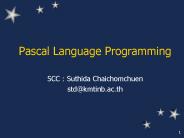CSCI1190: Beginning C Programming for Engineers - PowerPoint PPT Presentation
1 / 22
Title:
CSCI1190: Beginning C Programming for Engineers
Description:
CSCI-1190: Beginning C Programming for Engineers. Lecture 3: ... Trigonometric sine of x. sin(x) x raised to power y. pow(x,y) Absolute value of x. fabs(x) ... – PowerPoint PPT presentation
Number of Views:59
Avg rating:3.0/5.0
Title: CSCI1190: Beginning C Programming for Engineers
1
CSCI-1190 Beginning C Programming for Engineers
- Lecture 3 Functions
- Gang Chen
2
Control Structures
- if, if-else, switch
- while, do-while
- for
3
From 1 to 100 step 1
- int i1
- do
- i
- while (ilt100)
int i1 while(ilt100) i
for(i1ilt100i)
4
From 1 to 100 step 2
- int i1
- do
- ii2
- while (ilt100)
int i1 while(ilt100) i2
for(i1ilt100i2)
Question What is the value of i in the last
iteration?
5
From 100 to 1 step -1
- int i100
- do
- i--
- while (igt0)
int i100 while(igt0) i--
for(i100igt0i--)
6
1,2,4,8,16,32,64,,1024
- int i1
- do
- i2
- while (ilt1024)
int i1 while(ilt1024) i2
for(i1ilt1024i2)
- Other sequences
- 1,-2,3,-4,5,-6,7,-8,
- 1,1/2,1/4,1/8,1/16,1/32,1/64,
- 1,1/2,1/3,1/4,1/5,1/6,1/7,
- 1,2,3,5,8,13,21,34,
7
Functions
- Functions are modules with parameters (or
arguments), statements, and a result - Why functions?
- Decomposition
- Code reuse
8
Prototypes and Definitions
- A prototype declares a function with a return
type and a parameter list. - float power (float a, float b)
- A definition implements the function
- float power (float a, float b)
- float s
- / calculate the power of a and b /
- / put the result into the variable s/
- return s
- The definition must match the prototype
- Either the prototype or the definition must
appear before the function call
9
Calling Functions
- Variable(s) must match the parameter(s)
- Same number, same order, compatible type,
- Names could be different
- How about printf, scanf?
- printf(hello)printf(ad,a)
- Variable-length parameter list
- int printf(char, ) /stdio.h/
10
Type Conversion
- float power(float a, float b)
- float x,y,z
- int i,j
- power(x) / error /
- power(x,y,z) / error /
- power(i,j) / ok /
11
void
- For functions taking no parameters
- int f(void)
- For functions returning no values
- void g(void)
12
Math Functions
- Header file include ltmath.hgt
- Compiling gcc Wall o prog prog.c -lm
13
Random Number Generator
- include ltstdio.hgt
- include ltstdlib.hgt / srand() and rand() /
- include lttime.hgt / time() /
- int main()
- float r
- srand(time(NULL))
- r1.0rand()/RAND_MAX
- printf("Random number f\n",r)
- return 0
14
In-Class Exercise 3-1
- Write a program to generate 1000 floating point
random numbers between 0 and 1. - Find out the largest number, the smallest number
and the average.
15
Call by Value
- The execution of a function does not affect the
value of variables passed as parameters
void increment(int a) a int main()
int i1 increment(i)
printf("id\n",i) / i1, not 2 /
16
Variable Scopes
- A scope of a variable is the portion of the
program where the variable can be recognized - File scope
- global variables
- Function scope
- local variables, parameters
- Block scope
- local variables
17
Variable Scopes An Example
- include ltstdio.hgt
- int x / global variable /
- int f(float x) / parameter /
- return 0
- int g()
- int x / local variable /
- return 0
- int main()
- float x / local variable /
- int x / local variable /
- return 0
18
Recursion
- A function can call itself, either directly or
indirectly through other functions - Some conditional code is needed to stop the
recursion - Recursion is equivalent to iteration
19
Factorial
- The factorial of an integer
- n!n(n-1)(n-2)21
- 1!10!1
- Recursive equation
- n!n(n-1)!, if n0
- n!1, if n0
20
Factorial Recursion
- include ltstdio.hgt
- int factorial(int n)
- if(n0) return 1
- else return nfactorial(n-1)
- int main()
- int n
- printf("Enter n ")
- scanf("d",n)
- printf("d! d\n",n,factorial(n))
- return 0
21
Factorial Iteration
- int factorial(int n)
- int i,f
- for(i1,f1iltni)
- fi
- return f
22
In-Class Exercise 3-1
- Use recursion to implement the power function
that takes two integers. - Hint power(a,b)apower(a,b-1)































